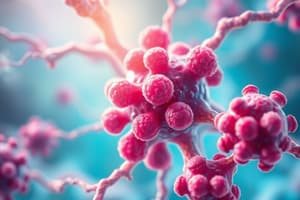Podcast
Questions and Answers
What is the main focus of cell biology?
What is the main focus of cell biology?
Exploring the structures, functions, and interactions of cells.
What are organelles and what do they do in cells?
What are organelles and what do they do in cells?
Organelles are specialized structures within cells that perform specific functions.
Why are research assistants in biology encouraged to participate in laboratory meetings and presentations?
Why are research assistants in biology encouraged to participate in laboratory meetings and presentations?
To develop essential skills and gain experience in the field.
What drives the inner workings of cells according to the text?
What drives the inner workings of cells according to the text?
What is the significance of undergraduate research in developing a career as a researcher?
What is the significance of undergraduate research in developing a career as a researcher?
What is the importance of understanding the cell cycle in cell biology?
What is the importance of understanding the cell cycle in cell biology?
How do cells communicate with each other, and why is this communication important?
How do cells communicate with each other, and why is this communication important?
In what ways does the study of cell biology contribute to understanding diseases like cancer and genetic disorders?
In what ways does the study of cell biology contribute to understanding diseases like cancer and genetic disorders?
What do cell biologists investigate in relation to cell communication pathways?
What do cell biologists investigate in relation to cell communication pathways?
How does the future of cell biology look like with the advancement of technology?
How does the future of cell biology look like with the advancement of technology?
Flashcards are hidden until you start studying
Study Notes
Understanding Cell Biology: A Foundational Perspective
At the heart of biology lies the intricate world of cells, organelles, and molecular processes. Cell biology, a subfield of biology, is dedicated to exploring the structures, functions, and interactions of cells—the fundamental units of life.
The Building Blocks of Life: Cells
Cells are the basic building blocks of all living organisms, ranging from single-celled microbes to multicellular plants, animals, and fungi. Their fascinating inner workings and diverse functions form the basis of life.
Organelles: The Mini-Factories of Cells
Within cells, organelles are specialized structures that perform specific functions. Some of the most important organelles include the nucleus (containing genetic material), mitochondria (the powerhouses of the cell), endULLIPTICS
- Undergraduate research is essential in developing a career as a researcher.
- Biology research assistants participate in laboratory meetings, presentations, and publications.
- Industry professionals in cell biology may make more money than academic researchers, but both paths offer unique opportunities.
- Assessing prospective laboratory assistants' professional knowledge is vital for ensuring they have the necessary skills.
Molecular Machinery: Proteins and Biochemistry
The inner workings of cells are driven by their molecular machinery, such as proteins, enzymes, and other biomolecules. Cell biologists study these molecules and their interactions, which reveal the complex, interconnected mechanisms within living organisms.
The Cell Cycle: Growth and Division
The cell cycle, a series of events leading to cell division, is another important concept within cell biology. Understanding the cell cycle helps researchers to explore the growth and development of organisms, as well as the origins of disease.
Cell Communication and Signaling
Cells communicate with each other through specific signaling molecules to coordinate their activities, maintain tissue homeostasis, and respond to changes in their environment. Cell biologists investigate these communication pathways to better understand the complexity of life.
Cell Biology and Disease
The study of cell biology provides insights into the causes and progression of diseases, such as cancer, infectious diseases, and genetic disorders. By understanding the normal functions of cells, researchers can identify abnormalities that contribute to disease and develop strategies to combat them.
Cell biology is a fascinating and multifaceted subfield of biology that continues to provide new insights into the inner workings of life. With the help of advanced techniques and technology, the future of cell biology is full of potential and promise for understanding the mysteries of life at its most basic level.
Studying That Suits You
Use AI to generate personalized quizzes and flashcards to suit your learning preferences.




